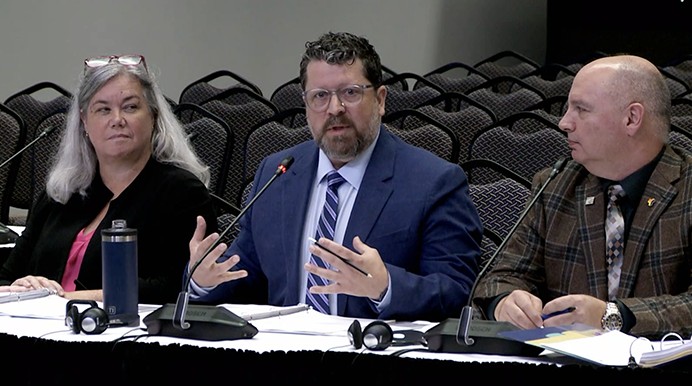
Liberals fulfill pledge to up CBC funding by $150M
By Christopher Guly
OTTAWA – While the federal government announced some $51 billion in cuts and savings and projected a deficit of about $78 billion in its budget delivered on Tuesday by Finance Minister François-Philippe Champagne to address what he characterized as a “level of uncertainty higher than what we have seen and felt for generations,” Canada’s film and television industry welcomed a significant funding allotment as part of the government’s plans for $141 billion in new spending.
The Canadian Media Producers Association (CMPA) “applaud[ed] groundbreaking cultural sector investments” in the budget.
“Today’s budget is a win for Canadian media producers, for Canada’s cultural sovereignty and for all Canadians,” said Reynolds Mastin, president and chief executive officer of the CMPA in a statement. “Against a backdrop of unprecedented trade uncertainty, the investments announced in the federal budget will bring much-needed stability for the Canadian media production sector.”
Beginning in 2026-27, Telefilm Canada will receive $150 million over three years “at a pivotal time for the industry as it strives to bolster its competitiveness and resilience amid the many challenges facing the sector,” said Executive Director and CEO Julie Roy in a statement.
The budget earmarked $127.5 million over three years, starting in 2026-27, to the Canada Media Fund to support the country’s audiovisual content creators.
“This investment in our screen-based storytellers is a recognition that culture is a national and strategic priority – one that strengthens Canada’s cultural sovereignty, global competitiveness and shared identity,” the CMF said in a statement.
President and CEO Valerie Creighton said that “investing in the cultural industries shapes who we are as a country and our place on the world stage, while also boosting economic growth, creating jobs across the country and bringing us together as Canadians.”
“In times of uncertainty and division, our stories are where we find connection and empathy,” she said in the CMF’s statement. “Without our stories, the promise of both economic and social returns for Canadians cannot be fulfilled.”
The budget gives the National Film Board a boost “to produce and share Canadian content with the world” through $26.1 million in funding over three years beginning in 2026-27, while $150 million will go to CBC/Radio Canada in 2025-26 “to strengthen its mandate to serve the public and to better reflect the needs of Canadians.”
During the spring federal election campaign, Prime Minister Mark Carney said a reelected Liberal government would increase the public broadcaster’s annual funding by that amount.
But before the election, then-heritage minister Pascale St-Onge released a plan, developed in consultation with an advisory committee established last year, which proposed to increase the $33.66 in per capita funding CBC/Radio Canada receives to $62.20 per capita, along with an end to advertising on all news and public affairs programming on the pubcaster’s television, radio and online platforms.
The 2025 budget said that the government would “explore modernizing CBC/Radio Canada’s mandate to strengthen independence” and work with the bilingual networks “to explore participation in Eurovision,” the annual international song contest organized by the European Broadcasting Union, of which CBC is a member.
A Canadian streaming service also received a small financial injection in the budget.
French-language platform, TV5MONDEplus, is set to receive $6 million over three years, starting in 2026-27, to support the purchase of Canadian content.
The Canada Council for the Arts will receive the same amount over the same period.
In a statement, Hélène Messier, president and CEO of the Association québécoise de la production médiatique, said the investments in film and television production “offer valuable predictability” at a time of anxiety for the audiovisual-production industry, “which has suffered considerable losses in recent years.”
“By investing in content that sets us apart, the Canadian government is making cultural industries a solid pillar in building a strong Canada,” she said.
But not every organization in that sector was as enthusiastic about the budget’s offerings.
Kevin Desjardins, president of the Canadian Association of Broadcasters, said in a statement that “the CAB is deeply disappointed that key recommendations to support Canada’s broadcasting sector – namely, the expansion of the Canadian Journalism Labour Tax Credit and increased federal advertising investment in Canadian broadcast media – were not included.”
He acknowledged that the budget provided “significant new funding for CBC/Radio Canada and continued support for the Canadian Periodical Fund” – in the amount of $38.4 million over three years, beginning in 2026-27, for the Special Measures for Journalism component of the CPF to support small and community news outlets.
“However, bolstering the public broadcaster and print journalism alone will not save local news, preserve Canadian content or sustain the broadcast industry as a whole,” said Desjardins.
“Private broadcasters remain the backbone of local news delivery in communities across Canada, and without targeted support, many are at risk of disappearing.”
Screenshot of CAB President Kevin Desjardins


